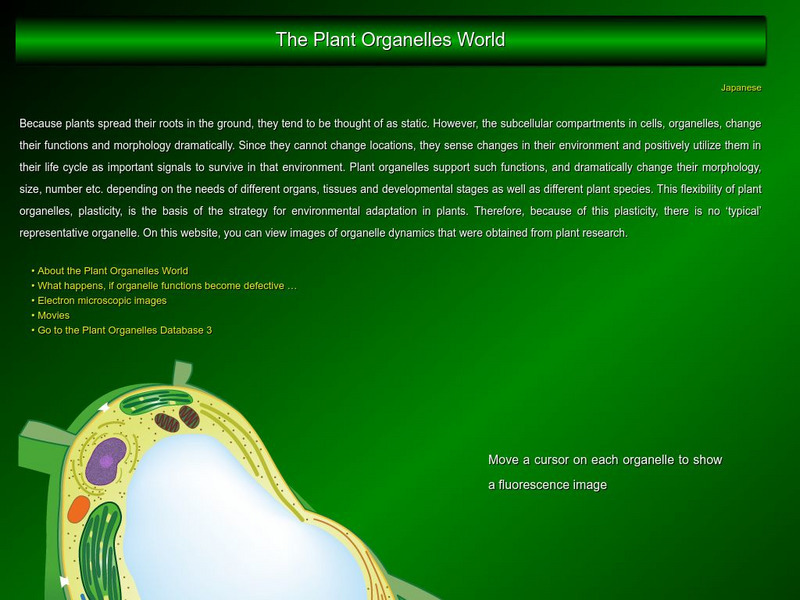Hi, what do you want to do?
Curated OER
The Great Archeological Dig
Students explore biology by identifying a diagram. In this cell anatomy instructional activity, students read a story about archeology and conduct a fictitious archeology dig in class in which they search for animal cells. Students...
Curated OER
Cell-a-bration
Fifth graders study the structures of a plant cell and animal cell. They create a graphic organizer and a food model. Finally, they write an essay comparing and contrasting plant and animal cells.
Cold Spring Harbor Laboratory
Genes Are Real Things
Proving microscopic structures exist is a difficult task. Learn how scientists did just that in the mid-1800s as they set out to identify the cellular structures related to genetics. The online lesson explains the collection of work that...
Curated OER
The Giant Cell
After actively participating in a unit on cells, the middle schoolers act out and become the organelles. They will act out and explain the functions of what each of the organelles do for the cell.
Curated OER
Biology: Make a Model Cell
Students compare and contrast plant and animal cells and then create a model of the latter. They visit Websites to view the cells and answer questions about them. In pairs, students create cell models using plastic baggies, syrup,...
Curated OER
The Living Environment
Sixth graders show what they know about plant and animal cells. In this cell project activity, 6th graders get to choose a project based on their learning style. They can create a visual representation of cells, auditory forms, or build...
Curated OER
Chloroplasts
Students study chloroplasts, their structure and evolution. In this photosynthesis lesson students experiment with polarized light and the production of chlorophyll.
The Science Spot
Flower Basics
Learn about plants and pollination with a worksheet about the parts of a flower. After labeling the anatomy of a flower using a word bank, kids explain the difference between self-pollination and cross-pollination, and unscramble...
Curated OER
Cell-ebrations in Science
Students recognize that all living things are made up of cell and that they cannot easily be seen by the naked eye. Students become familiar with the use of microscopes as a tool for investigation.
Curated OER
Temperature and the Tomato
You will need a photovoltaic system and monitor at your school in order to obtain all of the data required to thoroughly implement this lesson. Your class monitors daily temperature and insolation amounts over a two week span of time....
Curated OER
Sugar and carbohydrates, protein, fat and water - that's what little plants are made of!
Students identify photosynthesis as the mechanism by which plants convert sunlight energy into a usable energy source for plant processes. They identify photosynthesis as the mechanism by which plants create a molecule that can be used...
Curated OER
Biotechnology
Students explore biotechnology through various activities. In this biology instructional activity, students analyze its pros and cons. They study and read informative articles about biotechnology.
Curated OER
What Do Genes Look Like?
Seventh graders describe the basic structure of the DNA molecule. They identify what an inherited trait is and how it can be determined by one or more genes. Finally, 7th graders identify that plant and animal cells contain several...
Curated OER
DNA the Easy Way (and "Gram Stain" Without the Mess)
Students visualize DNA from cells and explain the basis and importance of the Gram-stain reaction and to perform the KOH test equivalent.
Virginia Department of Education
Photosynthesis and Cellular Respiration
Provide high schoolers with their own indoor gardens! Emerging scientists discuss the process of photosynthesis and germinate seeds before growing plants in multiple lighting conditions. The hands-on application allows...
Virginia Department of Education
Classification of Organisms
Searching for the perfect indoor/outdoor activity that allows class members the opportunity to learn about organism classification? Here, pupils research organisms and categorize them according to domain and kingdom over the course...
Curated OER
Light Microscopes
Seventh graders study the parts of a light microscope, and its proper use. They identify each part and explain why it is important to know how to use this tool. They practice observing newsprint on a wet mount slide.
Curated OER
Dietary Fiber
Learners examine the different types of fiber and their benefits. In this investigative lesson plan students find good sources of fiber in different foods.
Curated OER
Can Photosynthesis Occur at Saturn?
Young scholars identify the different requirements for photosynthesis to take place. In this space science lesson, students simulate conditions in Saturn to investigate if photosynthesis is possible there. They use data and observations...
Curated OER
Asexual Reproduction
In this asexual reproduction instructional activity, students compare and contrast different types of asexual reproduction processes by examining prepared slides and completing 20 short answer questions, 4 drawings, and 9 fill in the...
BiologyWise
Biology Wise: Basic Unit of Life: Plant Cell Structure and Functions
Describes the three types of plant cells and their differences, and the structures within a plant cell and their functions.
University of Missouri
Oklahoma State University Biotech Adventure: Plant Cell
Follow this link to a clearly labeled diagram of a plant cell. Includes written descriptions of all the parts of the cell.
BBC
Bbc: Gcse Bitesize: Cell Structure Aqa
This lesson focuses on plant cell structures including the parts of cell structures and their functions, cell structures that are in both plants and animals, and the cell structures found only in plants and their functions. Links to a...
Other
National Institute for Basic Biology: The Plant Organelles World
This web resource provides basic information about structure and function of plant organelles through a large interactive cell drawing, as well as many opportunities to explore further. Links lead the learner to several short movies of...



























